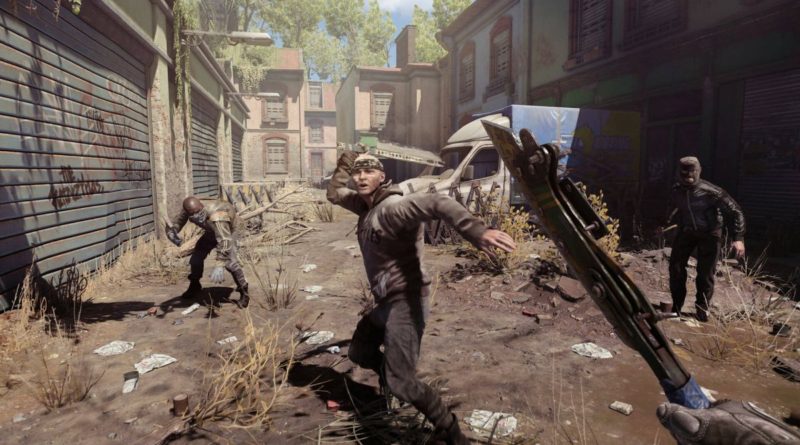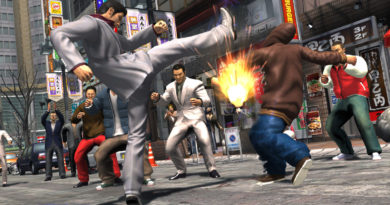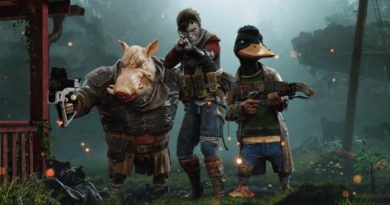Dying Light 2: Stay Human
When a game, in an indefinable way, makes you feel at ease from the moment it starts, it’s generally a good sign. That’s certainly what Dying Light 2 does – especially for those who played its 2015 predecessor. The franchise’s two key attributes, parkour-style movement and a creamy, precise and super-satisfying melee combat, are not only in evidence from the start, but have benefited from plenty of refinement since the first Dying Light game.
It’s somewhat ironic that Dying Light 2 swiftly makes you feel at ease, since the environment it plunges you into is anything but comfortable. Its events take place 15 years after the original viral outbreak depicted in the first game, and show a world in a dire state (in a way that strikes plenty of chords after our own real-life pandemic experiences). Dying Light 2’s protagonist, Aiden, is a so-called Pilgrim, one of the few intrepid humans willing to venture outside the walled cities that remain. Haunted by memories of childhood experimentation, he is on a quest to find his sister Mia, and his investigations lead him to the city of Villedor.
On the way to Villedor, Aiden acquires a GRE access key – the GRE being the medical, quasi-paramilitary organization that sprung into action to find a cure for the first game’s viral outbreak in Harran, but was blamed for further outbreaks and hounded into oblivion. That GRE key – the only means of unlocking anything GRE-related, of which there is plenty in Villedor – eventually becomes the game’s prime plot MacGuffin.
Dying Light 2 price and release date
- What is it? A first-person open world RPG set in a zombie-filled dystopia
- Release date? February 4, 2022
- What can I play it on? Xbox One, Xbox Series X/S, PS5, PS4, PC
- Price? $54.99 / £54.99 / $AU99.95
The rooftops of Villedor

After an encounter with some Renegades – a somewhat Borderlands-style street-gang faction – and getting infected with the zombie-inducing virus, Aiden makes it to Villedor. There he is nearly hanged because he doesn’t have a biomarker: a wristband that changes color if he’s about to turn into a zombie. A character called Hakon rescues him and, having acquired said biomarker, the fun begins in earnest.
Like the first game, a day-night cycle is a prominent feature: the Infected (as Dying Light 2 calls its zombies) mostly sleep indoors by day and come out onto the streets to wreak havoc at night, so it’s safest for Aiden to use his parkour skills to traverse Villedor via its rooftops after dark. At first, the action is confined to the district of Old Villedor, but Aiden is desperate to reach the city’s skyscraper-studded Central Loop, where information regarding Mia, he’s told, can be found in a bar called the Fish Eye.
But before he can get to Central Loop, there’s a lot of story-driven action to undergo. The Metro tunnel leading from Old Villedor to other parts of the city is under the control of the Peace Keepers (known as PKs), whose leader, Lucas, has been assassinated. The new leader of the PKs, Aitor, agrees to let Aiden through if he finds out who killed Lucas. But Aiden also gets caught up in performing missions for the Survivors, who view the PKs as oppressors.
A welter of systems feeding into the story
It swiftly becomes apparent that, to an even greater extent than the first game, Dying Light 2: Stay Human is a complex, full-blown RPG masquerading as a mere zombie game. It boasts a dizzying number of systems that feed into each other, yet cohere in near-miraculous fashion. For example, Aiden can collect Inhibitors, which allow him to improve his base stats for health and stamina (the latter crucial for both combat and parkour). Completing the story missions, side missions, and the many random activities dotted around the city reward XP to spend on new parkour and combat abilities.
Dying Light 2: Stay Human is a complex, full-blown RPG masquerading as a mere zombie game.
The story also branches, forcing you to make decisions at certain points, thereby earning favor or scorn with particular characters or individual factions – although you can often afford to be a bit cavalier, since pretty much everyone you meet will betray you at some point.
Plus there are crucial infrastructure buildings, including water towers, windmills, electrical sub-stations and Metro stations, that Aiden can power up or unlock, and then assign to specific factions, which will physically alter the surrounding area – Survivors will install ground-level crash-mats allowing you to fall from heights without damage, while PKs will set up zombie traps. This changing city is one of the big new features added to Dying Light 2, but it isn’t enormously successful, amounting to more of a curiosity than anything that significantly changes the gameplay.
Becoming a zombie-genocide machine

Then there’s a vast amount of loot to collect, including crafting materials, weapons, armor, and valuables that can be sold to merchants. Craftmasters will sell you blueprints for useful offensive and defensive objects such as mines, Molotovs, health packs, and immunity boosters that stop you from turning into a zombie when you’re away from UV light (which basically fries the Infected). Killing vast numbers of different types of zombies yields Infected trophies, which you can cash in at a Craftmaster to upgrade those blueprints. Cute touches abound – for example, to craft health packs, you need to scavenge honey, chamomile, lavender, and resin.
As Aiden levels up, better weapons and armor become available, and he soon becomes a satisfying zombie-dispatcher. There are some great combat moves, such as one in which Aiden simply whirls around in a circle, damaging anything within range of his blade. If you time your block perfectly, you can vault over the nearest zombie and launch a vicious flying kick at any other zombie in the vicinity. Guns are, mercifully, completely absent, and the weapons are cobbled together from rusty machetes, street signs, cricket bats and the like, although you do also find bows. The best weapons can be upgraded with fire, explosive, electricity or poison effects. Environmental tools abound, too, like gas canisters you can pick up, light, then throw with satisfying accuracy.
At first, you’re told to only enter zombie hives at night when many of them are out roaming the streets. But eventually, you realize there’s just too much fun to be had taking out huge swathes of zombies in one go. You do encounter zombies bosses in designated spots and they offer tasty rewards. And if you venture down to the street at night, all surrounding zombies will start chasing you, although you can find hiding spots to evade them or run to the sanctuary of a UV-light haven.
A nicely observed story

Dying Light 2’s story is pretty decent, too. It changes up when you reach Central Loop and are given a paraglider – in keeping with the rest of the game’s finely honed control system, it’s wonderfully maneuverable, and you can keep yourself in the air for ages by flying over air vents. You also get a grapple hook which leads to some of the hardest story-missions, where you must perform seemingly impossible feats of parkour.
While Dying Light 2 is at least distinctive in visual terms, you wouldn’t say that it looks spectacular.
Towards the end, the story gets a tad hurried, with twists and unexpected exposition around every corner (although there are some satisfyingly challenging boss battles). In general, though, developer Techland does well to weave vastly disparate elements, including flashbacks to Aiden’s childhood being experimented on in a GRE facility, into a coherent, believable whole. The ultimate ending we got felt somewhat unsatisfying, however. And if we were to register one major criticism, it would be that you sometimes come across dodgy voice acting (particularly among the Renegade faction), and the quality of the dialogue can be patchy. Also, while Dying Light 2 is at least distinctive in visual terms, you wouldn’t say that it looks spectacular – which is common among most of its cross-gen peers.
But, infamously, there’s a vast amount to do after the story finishes – developer Techland fueled controversy by saying that after the story’s 20 hours, it will take you 500 more hours to complete everything in the game. Whether that’s true remains to be seen, but the point is that both the game world and the zombie-killing tools with which you’re endowed are so seductive that if you’re anything like us, you’ll keep on going back to it. Pre-launch, the only online play Dying Light 2 offered was the chance to jump into other people’s games if they asked for help which, frankly, has limited appeal: why would you ask for help when slicing and dicing zombies is so satisfying? But it will be interesting to see how its online gameplay develops.
It really is an open-world playground of zombie-decapitating delights and, given that it also has a decent, branching storyline plus all the trappings of a cutting-edge RPG, you’ve got to applaud Techland’s sheer ambition. Not to mention its skill in pulling off something so complex that still feels coherent. It sounds like an oxymoron, but Dying Light 2: Stay Human might be the most intelligent zombie game yet.
Verdict
Techland appears to have made a bid to create the greatest — or at least most complete — zombie game ever with Dying Light 2: Stay Human. It’s certainly the zombie game that has everything: deep RPG mechanics, sumptuous melee combat and parkour, a day-night cycle that influences gameplay, a complex, branching storyline and a paraglider. That the whole thing hangs together so well is not far short of miraculous.
Post Views:
2





